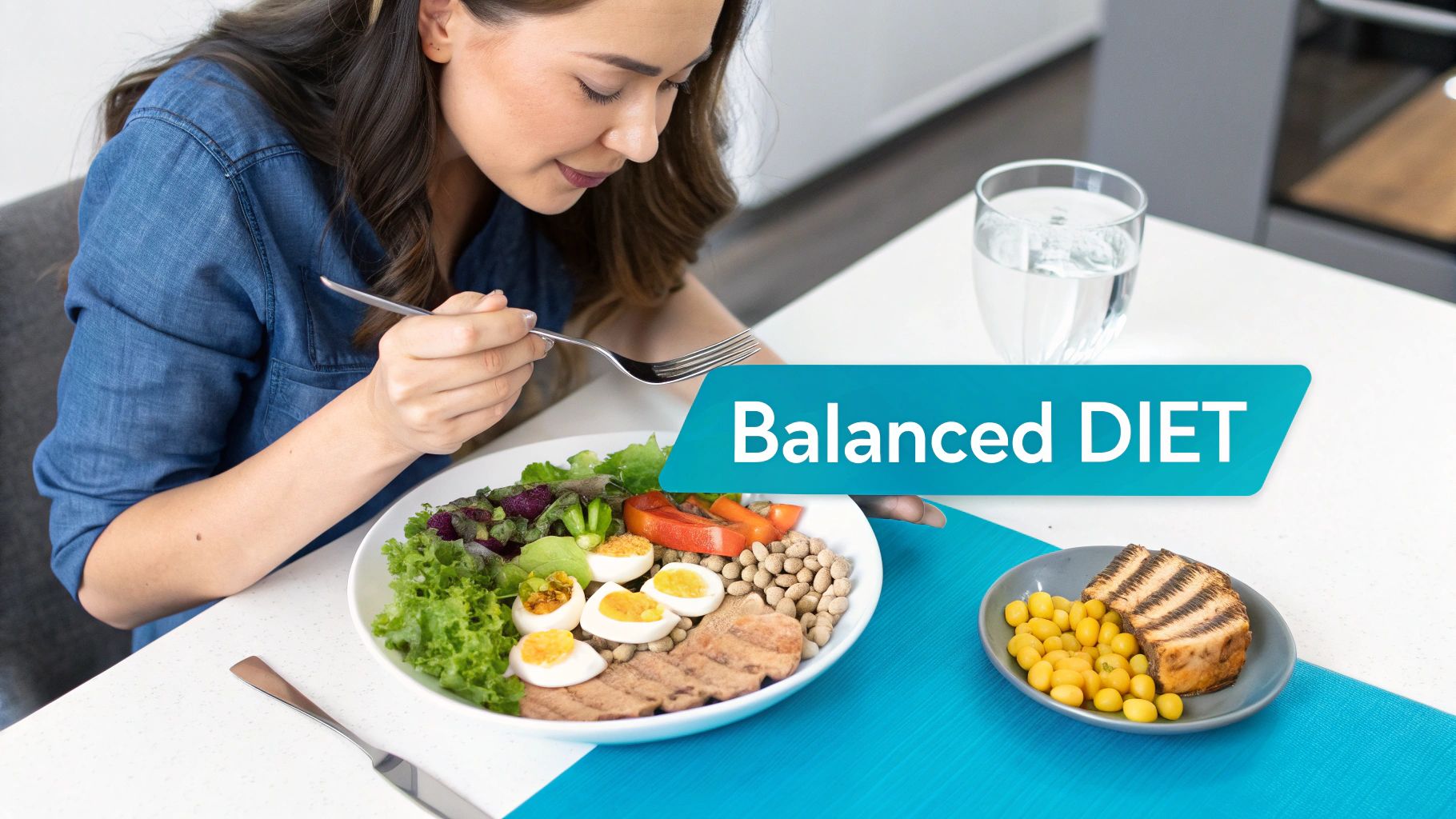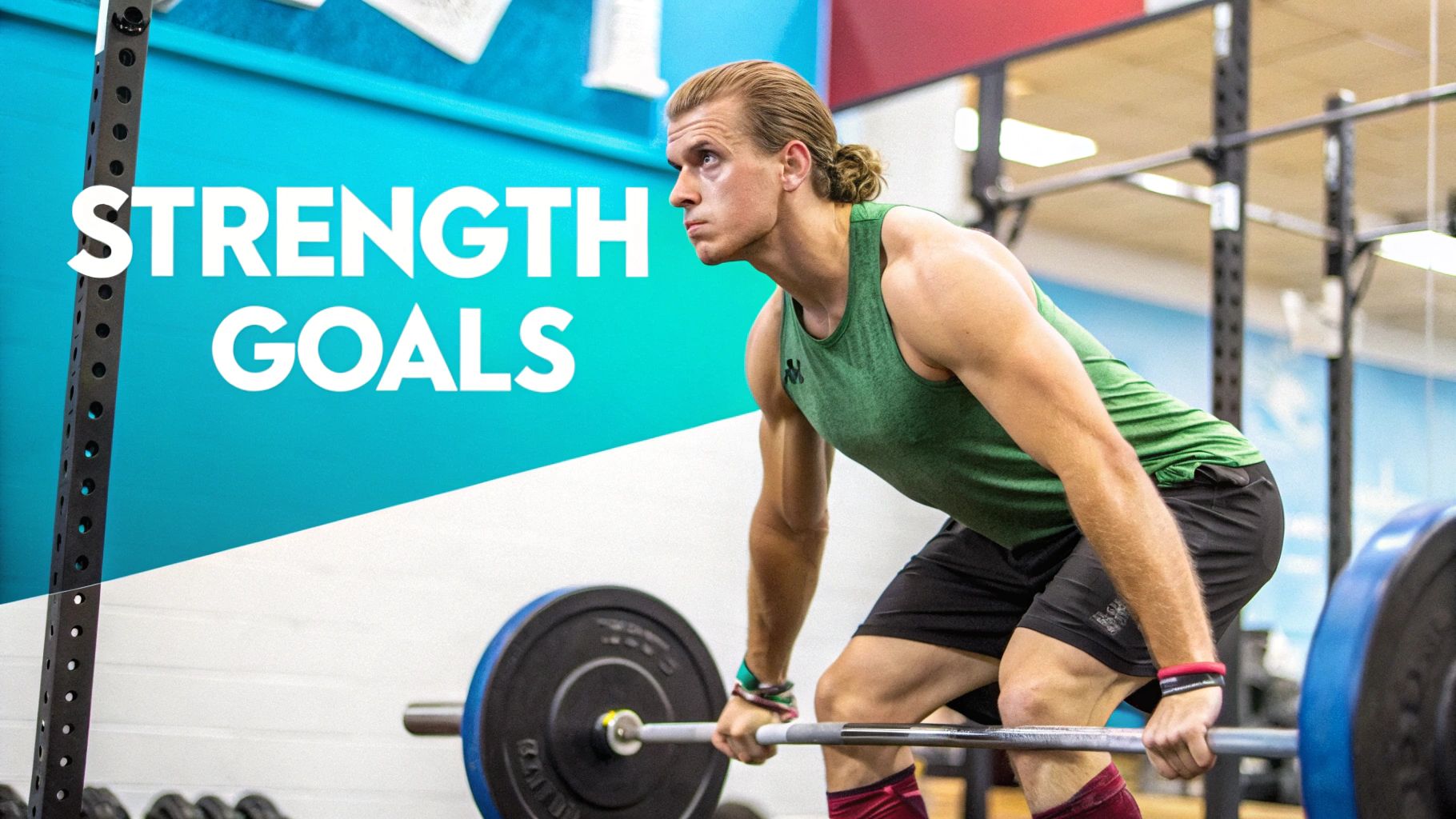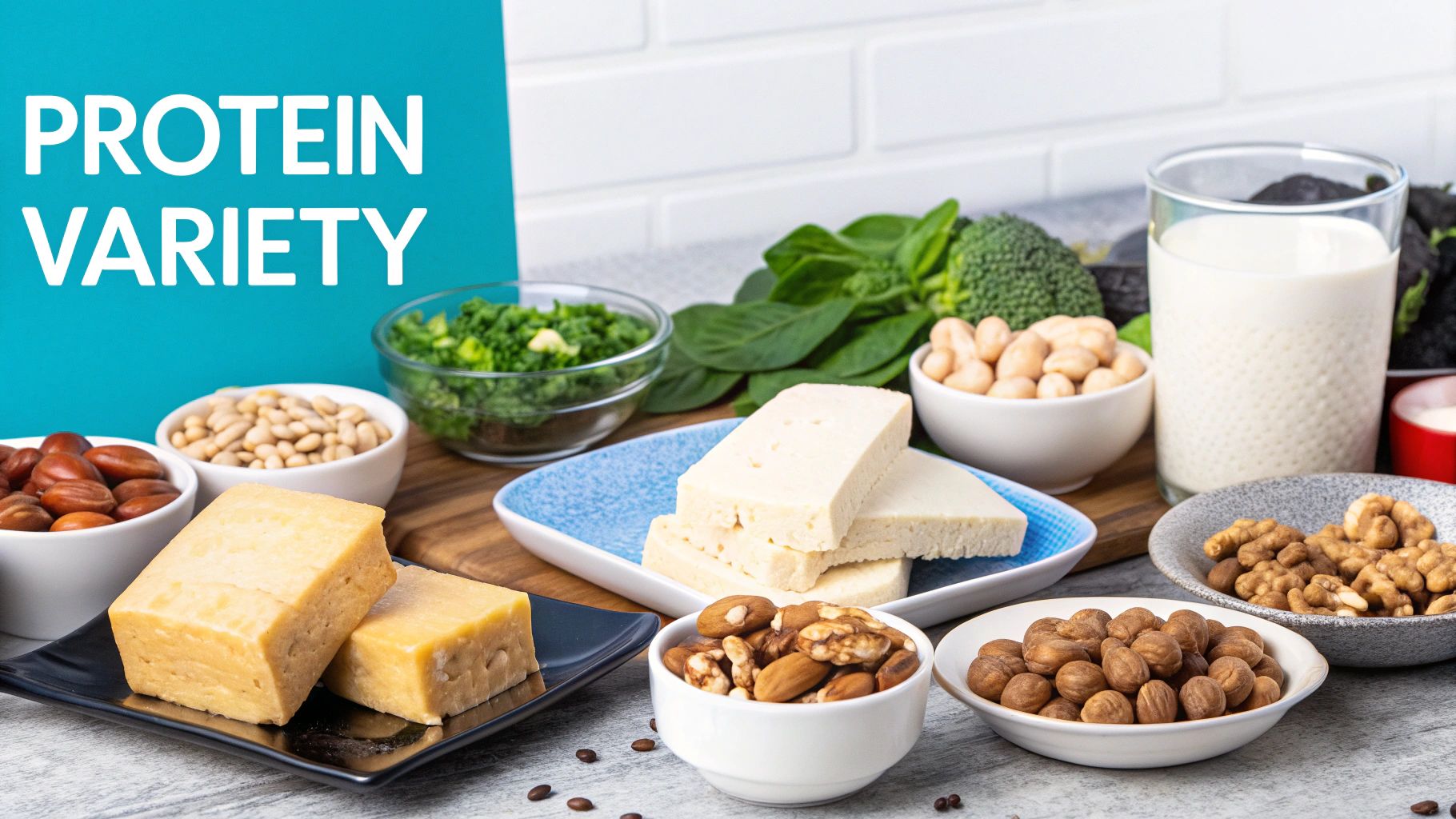The Truth About Women's Protein Needs: Beyond Minimum Standards
Tired of conflicting protein advice? You're not alone. As a former NFL athlete and kinesiologist, I've seen firsthand how proper protein intake transforms women's bodies - yet 87% of women aren't getting enough to support their fitness goals. Whether you're trying to lose fat, build muscle, or just feel more energized, protein is your secret weapon.
Just ask Chase, my Kova Method co-founder. She transformed her body by losing 30 pounds of fat while gaining lean muscle, and it all started with fixing her protein intake. The best part? She did it while still enjoying her favorite foods and maintaining a busy lifestyle.
→ Join the Kova Method today and get our complete protein guide, including our Trader Joe's and Costco grocery lists, fast food protein hacks, and the exact system Chase used to transform her body. Plus, you'll get access to our private community of women who are already seeing results using our proven sprint method. Download our completely free body recomp guide so you can finally crush your fitness goals

Let's talk about protein - that essential nutrient women's bodies crave! While the Recommended Dietary Allowance (RDA) suggests 46 grams of protein daily for women, this number is simply the bare minimum to prevent deficiency. It's like having just enough gas to drive across town when your body actually needs a full tank to thrive!
Many women following this minimum guideline miss out on amazing benefits that come with proper protein intake. Research has shown that the Acceptable Macronutrient Distribution Range (AMDR) actually recommends between 50 and 175 grams daily, depending on your calorie needs. That's a huge difference from the basic RDA! Want to learn more about this disparity? Check out this fascinating report from the Nutrition Coalition on protein recommendations in dietary guidelines.
Why the RDA Often Falls Short
Think of the RDA as a one-size-fits-all t-shirt - it technically works but doesn't account for your unique body and lifestyle needs. During pregnancy and breastfeeding, your protein requirements skyrocket to support your baby's development. And if you're hitting the gym regularly? Your muscles are literally crying out for more protein to repair and grow!
Protein is essentially the building material for your body - just like bricks for a house. A larger, more active "house" naturally requires more materials to maintain its structure and function at its best.
Body Weight: A More Personalized Approach
Want a better way to calculate your protein needs? Try using your body weight as a guide! Most experts recommend 0.8 to 1.0 grams of protein per kilogram of body weight as a starting point. This smarter approach considers your individual size and composition.
For example, if you weigh 150 pounds (68 kg), you'd aim for approximately 55 to 68 grams of protein daily. Of course, this number shifts depending on your activity level, age, and health goals - but it's already more personalized than the basic RDA!
The Importance of Protein for Women
Getting enough protein isn't just about building muscle - it supports virtually every aspect of women's health! From maintaining strong bones and beautiful hair to powering your immune system, protein is your body's true best friend.
One of the best benefits? Protein helps you feel full longer, which can help manage your weight naturally and prevent those mid-afternoon energy crashes. When you consume adequate protein, you're not just checking a nutritional box - you're supporting your entire wellbeing from the inside out!
Bottom line: Don't settle for the minimum when it comes to your health. Your amazing body deserves protein levels tailored to your unique needs, not just the basic prevention of deficiency!
Protein Through Life's Transitions: Meeting Your Body's Changing Demands
Did you know that your protein needs aren't static? They actually shift dramatically throughout your life! Hormonal changes from adolescence to post-menopause play a huge role in how your body processes and utilizes protein. This means that the protein intake that perfectly fueled your body in your 20s might fall short when you reach your 40s and beyond.
Adolescence, Adulthood, and Beyond
During those exciting teenage years, protein becomes absolutely crucial! It supports the rapid growth and development that happens during puberty. As we transition into adulthood, the focus shifts to maintaining muscle mass and bone health – particularly important for women.
Later in life, as we approach perimenopause and menopause, those hormonal fluctuations can lead to decreased muscle mass and bone density. This is when protein truly shines! Adequate protein intake, paired with regular exercise, becomes the foundation for maintaining strength and mobility during these important transitional years.
The Protein Demands of Pregnancy and Lactation
Pregnancy and breastfeeding are times when your protein needs skyrocket! Your body isn't just taking care of itself anymore – it's building and nourishing a whole new human being. This increased demand supports fetal growth, placental development, and milk production.
Many women unknowingly consume too little protein during these critical periods, which can impact both their own health and their baby's development. Proper nutritional management is absolutely essential for both maternal and fetal wellbeing. Want to learn more about this fascinating topic? Check out this informative resource on maternal nutrition.
Recognizing the Signs of Inadequate Protein Intake
Being able to spot the subtle signs that you're not getting enough protein is so important! These signs might include unexplained fatigue, slow recovery after workouts, thinning hair, or brittle nails. Paying attention to these indicators helps you make proactive adjustments to support your body's changing needs.
For example, that persistent tiredness might not just be from your busy schedule – it could actually mean your body lacks the protein it needs to repair and rebuild properly. Similarly, wounds that take forever to heal might signal that your body is missing the essential building blocks for tissue repair.
Adapting Your Protein Intake
Don't worry – adjusting your protein intake doesn't mean obsessively tracking every bite! Instead, focus on including protein-rich foods in every meal and snack. Think delicious options like lean meats, poultry, fish, eggs, dairy, beans, lentils, nuts, and seeds.
Consider your activity level too. Are you exercising regularly? If so, you'll likely need more protein than someone who's less active. And remember to adjust based on your life stage – like increasing your intake during pregnancy. Understanding your individual protein requirements is an ongoing process that requires staying tuned to your body's signals through life's many transitions.
Active Women's Protein Playbook: Fueling Performance and Recovery

Ready to take your fitness journey to the next level? Understanding your protein requirements is absolutely crucial! While we've covered the basics of protein for women earlier, those of you crushing workouts regularly need a more tailored approach. Let's dive into exactly how much protein you need to power through those training sessions and bounce back faster, whether you're hitting the gym occasionally or training like an athlete.
Why Protein Matters for Active Women
Forget the myth that protein is just for bodybuilders! It's the essential building block your body needs for muscle repair and growth. Think of protein as the construction materials your body uses to rebuild muscles after you've challenged them. Without enough of these materials, your recovery suffers – leading to lingering soreness, dragging fatigue, and higher injury risk. This is particularly important for women, who naturally have less muscle mass than their male counterparts.
Protein is also your secret weapon for feeling satisfied after meals, which is perfect when you're juggling workouts with healthy eating. That feeling of fullness helps you avoid mindless snacking and make better food choices throughout the day. Plus, adequate protein intake keeps your metabolism humming along – a must-have for reaching those fitness goals you've set for yourself!
Determining Your Protein Needs
So how much protein should you actually aim for? The answer depends on how intensely you train and what you're trying to achieve. A solid guideline is to consume between 1.2 to 2.0 grams of protein per kilogram of body weight. For a 150-pound woman, this works out to roughly 82 to 136 grams of protein daily.
To help you understand exactly what this means for your specific activity level, check out this breakdown:
| Activity Level | Protein Requirement (g/kg bodyweight) | Daily Example (150lb woman) | Primary Benefits |
|---|---|---|---|
| Lightly Active (yoga, walking) | 1.2 - 1.4 | 82-95g | Maintains muscle mass, supports overall health |
| Moderately Active (running, strength training 2-3x/week) | 1.4 - 1.6 | 95-109g | Supports muscle growth and repair, improves recovery |
| Very Active (intense training 4-7x/week) | 1.6 - 2.0 | 109-136g | Maximizes muscle protein synthesis, enhances performance and recovery |
Protein Timing and Distribution
Getting your total daily protein right is important, but protein timing can really boost your results. Eating protein shortly after your workout kicks your muscle recovery into high gear. Aim for 20-30 grams of protein within 30-60 minutes after finishing your sweat session.
Don't make the mistake of loading all your protein into one giant meal! Spread it throughout your day by including a protein source at every meal and snack. This steady supply gives your muscles a constant stream of building blocks for repair and growth – much more effective than the feast-or-famine approach.
From smashing your workouts to bouncing back quickly, getting enough protein is non-negotiable for active women. When you understand your personal needs and use smart strategies like proper timing, you'll fuel your body for amazing performance and see those fitness results you've been working for! Now, let's look at something equally important – the quality of the protein sources you're choosing.
Protein Quality Matters: Selecting Sources That Serve Women's Bodies
Ask any nutritionist and they'll tell you straight - not all protein is created equal! This is especially true when we're talking about meeting women's unique nutritional needs. Simply hitting your daily protein target isn't enough; the sources of that protein dramatically impact how effective it is for your body. Let's dive into the exciting world of protein quality and discover how different sources can influence everything from your hormone balance to bone density.
Biological Value and Complete Amino Acid Profiles
Have you ever wondered why some protein sources seem to work better than others? That's where biological value (BV) comes in! This measures how efficiently your body absorbs and uses protein from different foods. Think of it like fuel for your car - high BV protein is premium gasoline that gives your body maximum energy, while low BV protein is like diluted fuel that doesn't perform as well. Animal proteins typically offer higher BV than plant-based options.
Another crucial factor is the amino acid profile. Proteins are made of building blocks called amino acids, and nine of these are essential - meaning your body can't make them on its own. When a protein contains all nine essential amino acids in the right proportions, it's called a complete protein, making it incredibly valuable for women's health!
Protein Sources and Women's Health Priorities
Some protein sources deserve special attention in women's diets because of their amazing nutritional profiles. Red meat, for example, is packed with iron - a mineral many women lack, especially during menstruation. Iron is vital for energy levels and making red blood cells. Fish brings wonderful omega-3 fatty acids to the table, supporting both heart and brain health.
Dairy products deliver calcium - absolutely essential for bone health, which becomes increasingly important as women age. Plant-based proteins like legumes, nuts, and seeds offer wonderful fiber and B vitamins that support digestion and energy. Soy products provide a complete plant-based protein option rich in isoflavones that may help manage those tricky menopausal symptoms.
Here's a helpful breakdown of key protein sources for women's health:
| Protein Source | Protein Content (per serving) | Complete Protein? | Key Nutrients for Women | Best For |
|---|---|---|---|---|
| Lean Beef (3oz) | ~20g | Yes | Iron, Zinc | Muscle growth, iron replenishment |
| Salmon (3oz) | ~22g | Yes | Omega-3s, Vitamin D | Heart health, cognitive function |
| Greek Yogurt (1 cup) | ~20g | Yes | Calcium, Probiotics | Bone health, gut health |
| Lentils (1 cup cooked) | ~18g | No | Fiber, Iron, Folate | Digestive health, plant-based protein |
| Almonds (1/4 cup) | ~8g | No | Fiber, Vitamin E, Magnesium | Heart health, healthy fats |
This table shows why different protein sources might be better suited to specific health goals. For example, if you're looking to support bone health, Greek yogurt might be your go-to, while salmon could be perfect if heart health is your priority.
Combining Proteins and Distributing Intake
Since many plant-based proteins don't contain all essential amino acids, you can get creative by combining them! Pairing rice with beans or lentils with whole grains creates a complete protein with all nine essential amino acids. This strategy is super important for women following vegetarian or vegan diets.
How you space out your protein intake throughout the day matters just as much as how much you eat. Try including protein with every meal and snack! This steady supply ensures your body has amino acids available all day for muscle repair, hormone production, and other vital functions. It's like building a house - you need a continuous supply of materials, not just one giant delivery in the morning. By focusing on both protein quality and consistent intake, you'll meet your protein needs effectively and support optimal health throughout all stages of life!
Red Flags: Is Your Body Crying Out for More Protein?

Are you missing the silent signals your body is sending about protein deficiency? For women especially, these warning signs often fly under the radar or get blamed on other issues. You might be walking around with a critical nutritional gap and not even realize it!
Recognizing the Subtle Signs
Ever feel like you're dragging yourself through the day despite a full night's sleep? Unexplained fatigue is one of the most common red flags of low protein intake. Your body simply doesn't have the building blocks it needs for proper repair and recovery. And if you've hit a stubborn weight plateau despite your best efforts, protein might be the missing piece. Your muscles need adequate protein to maintain their mass, which directly impacts your metabolic rate and calorie-burning ability.
Did you know your mood swings might be connected to your protein intake? It's true! Protein provides essential amino acids that form neurotransmitters - the chemicals that regulate your mood and emotions. When you're running low, this delicate balance gets thrown off, potentially leaving you irritable and emotionally unsteady. This protein-mood connection is rarely discussed but absolutely crucial to understand!
Overlooked Symptoms and Hormonal Fluctuations
Your bathroom mirror might be giving you protein deficiency clues! Hair thinning and brittle nails often signal that your body lacks the structural protein it needs. Think of it like building a house - without enough sturdy materials (protein), the structure (your hair and nails) becomes weak and fragile.
Working out regularly but taking forever to recover? Prolonged workout recovery is a major warning sign that your muscles aren't getting enough protein to repair themselves. This is particularly important for active women who may need significantly more protein than sedentary individuals.
Research has also suggested fascinating connections between protein intake and irregular menstrual cycles. Your hormones naturally fluctuate throughout the month, creating different protein requirements and even altering your appetite cues. Understanding this relationship can help you better address your body's changing needs.
Assessing Your Protein Intake
Simply counting protein grams might not tell the whole story. Instead, tune into how your body actually feels! Are you experiencing any of those telltale symptoms we discussed? How's your energy throughout the day? Do you bounce back quickly after workouts? Your body's signals often provide more valuable feedback than numbers alone.
For a starting point, try using a body weight calculation, aiming for approximately 0.8 to 1 gram of protein per kilogram of body weight. This personalized approach beats generic recommendations any day. Remember that your protein needs may change with your hormonal cycles, so stay flexible and responsive to what your body tells you.
For more targeted guidance on optimizing your protein intake, consider working with a registered dietitian or checking out resources like the Kova Method, which offers science-backed approaches specifically designed for women's weight management and body composition goals. By spotting these red flags early and responding to your individual needs, you can give your body the protein foundation it needs to truly thrive!
Your Personal Protein Equation: Calculating What Your Body Actually Needs

Tired of generic protein recommendations that don't fit your life? Let's dig into how to calculate your personalized protein needs! I'm going to walk you through step-by-step methods based on real evidence that you can tailor to your specific goals—whether you're focused on basic health maintenance, athletic performance, or improving your metabolism.
Calculating Your Baseline Protein Needs
Let's start with a simple approach using your body weight. The standard recommendation is 0.8 grams of protein per kilogram of body weight. For example, if you're a 150-pound woman (about 68 kg), you'd need approximately 54 grams of protein daily. But remember—this is just your starting point!
Factors Influencing Your Protein Needs
Your protein needs go way beyond just your weight. Several key factors make your requirements unique:
- Activity Level: The more you exercise, the more protein your muscles need for repair. Women who exercise intensely may need up to twice the baseline amount.
- Age: As we get older, maintaining muscle becomes tougher. Women in their 50s and beyond often need more protein than they did in their 30s to fight age-related muscle loss.
- Health Status: Injuries, illnesses, and recovery periods can dramatically increase how much protein your body needs for healing.
- Reproductive Stage: Pregnancy and breastfeeding create significant protein demands to support your baby's growth and milk production.
This means an active pregnant woman needs much more protein than someone who's less active and not pregnant—it's all about your individual situation!
Practical Tracking and Adjustment Strategies
You don't need to be obsessive about counting every gram, but tracking your protein intake for a few days can give you valuable insights into your current habits. There are tons of helpful apps that make this super easy.
The real key isn't perfect numbers—it's including protein-rich foods at every meal and snack. This consistent approach helps your body use protein effectively throughout the day. Try adding Greek yogurt to your breakfast, tossing lentils into your lunch salad, and enjoying salmon for dinner.
Recognizing Shifts in Your Protein Needs
Your body sends clear signals when your protein intake isn't matching your needs. Watch for these telling signs:
- Unexplained Fatigue: Constantly tired despite getting enough sleep? Your protein tank might be running low.
- Slow Workout Recovery: When muscle soreness hangs around way too long after workouts, it could mean you need more protein.
- Hair and Nail Changes: Brittle nails or thinning hair can sometimes point to protein deficiency.
- Weight Loss Resistance: If you're hitting the gym but not seeing results, inadequate protein might be part of the problem.
These signs help you fine-tune your intake to what your body truly needs. If you keep experiencing these issues, consider boosting your protein or working with a nutrition professional. Programs like the Kova Method offer personalized guidance for women's weight management and body composition that factors in your unique needs and goals. By figuring out your personal protein equation, you'll support your health and well-being through every stage of life!
Debunking Protein Myths: What Women Need to Know
The nutrition world is full of confusing information, especially when it comes to protein advice for women. Let's cut through the noise and get to the facts about what women really need to know about protein!
Myth 1: Protein Makes Women Bulky
This might be the most common misconception out there! Many women shy away from higher protein intakes because they're afraid of developing large, masculine muscles. Here's the truth: building significant muscle mass requires extremely dedicated training and a hormonal profile that most women simply don't have naturally.
Adequate protein actually helps women maintain lean muscle mass - which is essential for metabolism, bone health, and overall wellness. Think of protein as the foundation for a strong, healthy body, not something that will magically make you bulky overnight!
Myth 2: High-Protein Diets Harm Your Kidneys
You've probably heard this one before too. The reality? While people with existing kidney conditions may need to monitor protein intake, research shows that higher protein diets do not harm healthy kidneys at all.
Some studies even suggest that protein might be protective for bone health - becoming increasingly important for women as they age. Instead of fearing protein, focus on overall dietary balance and quality for your best health.
Myth 3: Your Body Can Only Absorb a Limited Amount of Protein Per Meal
Ever heard that your body can only use 30 grams of protein at once? This claim lacks scientific support! While protein synthesis does occur over time, there's no magical cutoff point where your body stops absorbing protein.
This myth often creates unnecessary stress about protein timing and portion sizes. A better approach? Distribute your protein intake throughout the day to support consistent muscle protein synthesis without stressing about specific gram amounts.
Myth 4: "Female-Specific" Protein Supplements Are Necessary
Marketing teams love targeting women with "female-specific" protein products that supposedly offer unique benefits. A closer look usually reveals they contain similar ingredients to standard protein powders, sometimes with added vitamins and minerals you're already getting in a balanced diet.
Before spending extra money on specialized products, check the actual nutritional content and compare it to your individual needs. Standard protein sources can likely provide the same benefits without the premium price tag!
Understanding Protein Absorption, Timing, and Processing
Women's bodies process protein similarly to men's - it's not a gender-specific process! The efficiency of protein absorption varies based on the source, with animal proteins generally having higher biological value than plant proteins, meaning your body can use them more efficiently.
That doesn't mean plant proteins aren't valuable - they absolutely contribute to your daily needs and offer other essential nutrients your body needs.
Timing protein around workouts can help optimize muscle recovery, but getting enough total protein throughout the day matters most. Don't focus exclusively on post-workout protein while neglecting your overall daily intake - that misses the bigger picture of supporting muscle protein synthesis and all your body's functions.
By separating facts from fiction, you can make smart, informed decisions about your protein needs. Don't let outdated myths or clever marketing dictate your nutrition choices! Focus on a balanced, protein-rich diet that fuels your body and supports your overall health.
Ready to take control of your health and reach your body composition goals? The Kova Method offers personalized guidance, science-backed strategies, and support specifically designed for women. Learn more about transforming your body and achieving lasting results with the Kova Method!
Article created using Outrank
